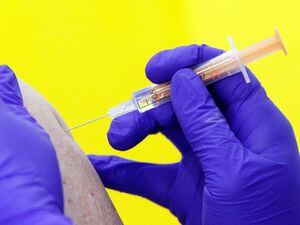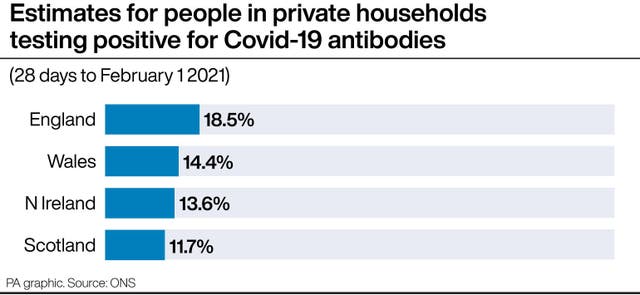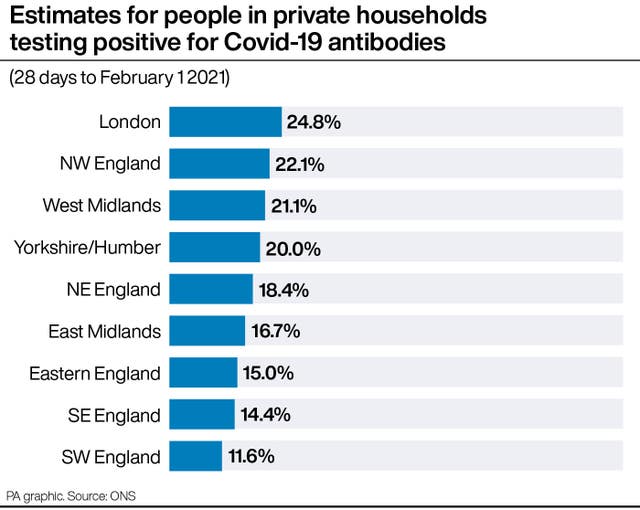Effects of vaccination ‘begin to appear’ as more older people show antibodies
In England, two in five over-80s have some level of immunity from the virus that causes Covid-19.

The number of people who have antibodies for the virus which causes Covid-19 has increased across the UK, showing the impact of the vaccination programme.
Having antibodies in the blood indicates that people have either previously been infected with the virus or have had a Covid-19 vaccine.
The Office for National Statistics (ONS) said that in England an estimated one in five adults would have tested positive for antibodies against the virus on a blood test in the 28 days up to February 1.
This compares to one in seven in Wales and Northern Ireland and an estimated one in nine in Scotland.

So those vaccinated first – including those over the age of 80 – will be among the first to show antibodies through blood tests.
Older people were more likely to have antibodies in England.
But in Scotland, Wales and Northern Ireland the highest rates were seen among younger adults.
The increasing number of people with antibodies reflects the effect of the vaccine programme as well as the high levels of infection seen in recent months, the ONS suggested.
In England there were 40.9% of people aged 80 years and over testing positive for antibodies.
In Wales this figure was 12.7% and in Scotland the figure was 11.6%.
The data for Northern Ireland includes those over the age of 70 and 9.1% of this group are estimated to have antibodies for the virus.
But experts said that it is still not known how long antibodies last for.
Esther Sutherland, principal statistician for the Covid-19 Infection Survey, said: “Antibody positivity rates have increased across all four nations and the effects of the vaccination programmes have begun to appear, especially in the older age groups.
“In England those aged 80 and over currently have the highest percentage of antibody positivity, most likely due to the high vaccination rate in this group.
“In Wales and Scotland those aged 16 to 24 years old have the highest percentage and in Northern Ireland it’s in 25 to 34-year-olds.
“We would expect younger groups to have high levels of antibody positivity after the period of high infection rates we have seen in the last few months.
“We will continue to closely monitor antibodies as the UK vaccination programmes continue to be rolled out.”
The ONS said that there was “substantial variation” in antibody positivity between regions in England.
In London almost one in four people are estimated to have antibodies (24.8%) compared with almost one in eight in the South West (11.6%).
There also appears to be varying rates of antibody positivity in the elderly across the four nations – though the researchers cautioned the figures only relate to those living in private households so will not reflect those in care homes.

– In England an estimated 18.5% of the population have antibodies, or 8.3 million people over the age of 16.
– In Wales an estimated 14.4% of the population have antibodies, or 365,000 people over the age of 16.
– In Northern Ireland an estimated 13.6% of the population have antibodies, or 201,000 people over the age of 16.
– In Scotland an estimated 11.7% of the population have antibodies, or 521,000 people over the age of 16.
Commenting on the figures, Dr Peter English, consultant in communicable disease control, said: “People infected with the SARS-CoV-2 virus usually develop antibodies two-to-three weeks after being infected.
“One of the big questions has been, and remains, for how long these antibodies can be detected after infection, whether people can be immune without detectable antibodies, and for how long.”
Dr Simon Clarke, associate professor in cellular microbiology at the University of Reading, said: “It shows a mixed picture across the United Kingdom, with England’s over-80s being the most likely group to have antibodies, presumably largely because of the extensive vaccination programme, but it is not possible to separate antibodies produced in response to vaccination from those which have been induced by infection.
“In England, Scotland and Wales, a relatively high number of 16 to 24-year-olds also have these antibodies, but this is presumably due to the higher levels of exposure to the virus, seen in that age group.
“It could be tempting to assume that quantifying antibody levels like this tells us the level and distribution of immunity to Covid-19 in the population, but we do not know what components of the immune system are required for immunity or how long protection will last. Until we have a much better idea of the correlates of protection, the picture will remain uncertain.”





